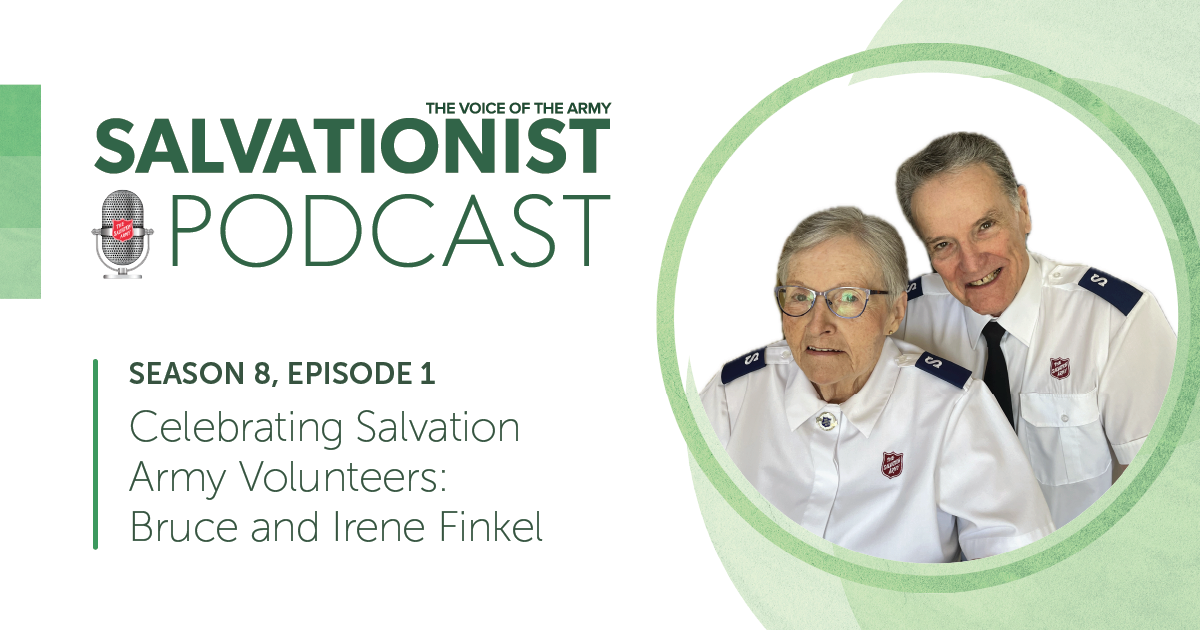 Major Campbell Roberts is the secretary for social program and national director of social policy and social services for the New Zealand, Fiji and Tonga Territory. He is responsible for all government and parliamentary relationships with the Army in New Zealand and is often called upon as a national spokesperson and media commentator on issues of poverty, prison reform, housing, welfare and employment.
Major Campbell Roberts is the secretary for social program and national director of social policy and social services for the New Zealand, Fiji and Tonga Territory. He is responsible for all government and parliamentary relationships with the Army in New Zealand and is often called upon as a national spokesperson and media commentator on issues of poverty, prison reform, housing, welfare and employment.
Major Roberts is the founding director of The Salvation Army's Social Policy and Parliamentary Unit (SPPU), which has a mandate to work toward the elimination of poverty in New Zealand. In recent days, Major Roberts has also been responsible for co-ordinating The Salvation Army's response to the September 2010 and February 2011 earthquakes in Christchurch, New Zealand.
Julia Hosking, staff writer, interviewed Major Roberts for Salvationist while he was in Toronto for the territorial social services conference.
How has The Salvation Army responded to the earthquakes in New Zealand?
Initially, our support was through feeding programs and psycho-social support. When there was further destruction and loss of life in February, our response increased to include visiting people and households with police, going into the areas where rescues were taking place and being part of the police teams that met with relatives of those missing. We recently implemented a $500 cash card for people to purchase resources, and because the trauma is very deep—partly due to the continuation of aftershocks—we've instituted a scheme of giving people a respite away from the city for four or five days.
You said the trauma from the earthquakes is very deep. How else has Christchurch been affected?
The first earthquake created a lot of disruption in terms of housing and so the second earthquake hit a patched city, not a repaired city. As a result, significant areas of Christchurch will not be able to be rebuilt due to soil and structural damage to the earth. Additionally, many roads are still impassable, the central city is inaccessible, buildings are slowly being demolished and 10,000 to 15,000 houses will need to be destroyed, with many more currently unliveable. Furthermore, because school buildings were also ruined, some schools have been forced to adopt a “shift system” where one school uses a building in the morning and another in the afternoon.
You seem passionate about social justice and social change. Is there a particular Scripture passage that resonates strongly with you?
The major themes that I see in Scripture are that we need to be about faith, we need to be merciful to people and we need to be about justice. That's captured most strongly in Micah 6:8: “And what does the Lord require of you? To act justly and to love mercy and to walk humbly with your God.”
The SPPU's mandate is to work toward the elimination of poverty. Is that a realistic possibility?
Poverty, in the way in which it takes away from the abundant life of a person, is evil. It is not only bad social policy, it is sinful. The Army's mission includes eradicating sin and seeing salvation for all. Likewise, the calls of Jesus were about the eradication of poverty and carrying out justice, so eliminating poverty is a missional imperative. Will all people be saved and all sin and poverty eradicated? Probably not. Rather than being “successful” in those tasks, however, we are called to be faithful and honour the claims of the gospel.

Why do you say poverty is sinful?
Much of the world's pain and suffering is caused by sinful systems, whether that is corrupt political systems or unfair conduct of businesses. There is talk about fair trade, so there is an assumption of unfair trade and, in that, there is sinfulness. Some people are the victims of those systems, so although the victimized person might be a sinner, because of another's actions, they are also “sinned against.” Jesus died for sin in all its forms, not for sin in some of its forms. As a result, we need to address the sin against people as well as personal sin.
The Canada and Bermuda Territory recently released the Dignity Report, which revealed 50 percent of Canadians believe that if poor people really want to work they can always find a job and that 25 percent believe people are poor simply because they are lazy. How do we counter attitudes like those?
The public relies on information from the media, which tends to take the worst or most dramatic stories and then portray them as the situation for all people. The Salvation Army has a vital role in changing this because we are meeting daily with people on the margins of society. We need to tell their stories and be their voice. We need to do research that shows why people are in poverty and what are the drivers of that poverty, such as poor housing, lack of income and racial disadvantage.
After forming the SPPU, we identified the 500 most-influential people in setting New Zealand's social and economic agenda. That includes leaders in politics, business, media, education and commerce. One of the ways I build relationships with the politicians is by sitting at the Wellington airport. I live in Auckland, where the SPPU is, and work part-time at territorial headquarters in Wellington, so I fly home every Thursday, the same time that the politicians fly home from parliament. There is never a week that I don't have at least one politician seek me out for a conversation. This provides me with the opportunity to share people's stories and speak on issues that are important to The Salvation Army.
Do you have an example of a small-scale act of social change?
One of my first appointments as an officer was as an industrial chaplain. I'd often talk to the management team and employees about their problems and reflect on them from a biblical and theological perspective. The general factory manager told me one morning that the board said he had to make 100 staff redundant and he wanted to do it in a “Christian way.” After much discussion, the management team decided that the redundancy was unjust and unnecessary and they needed to fight the board. That required risking their jobs and the life of the factory. I saw that morning an act of self-denying love and compassion, and I learned that when people take the teachings of the gospel seriously, justice can prevail.
Can you share a “success story” from a larger-scale campaign?
Although New Zealand was facing a housing crisis, the minister of housing said there was none. The SPPU staged a public demonstration to say that yes, there is a housing crisis. We took into one of our city squares a car that a family had lived in for several days. The media highlighted what is happening in terms of housing; that there are people living in cars or temporary shelters, doubling up in homes or needing to move frequently. We then suggested to the government ways to change the system, how more money could be put into housing and what policies could be implemented. We identified the need, provided some solutions that were practical and realistic and eventually the government increased the amount of money they put into housing and they changed the nature and provisions of housing.
How can we break the cycle of generational poverty?
In order to break generational poverty we need to ask, why is this family in poverty? What are the factors that are holding them back? Breaking the cycle of poverty means addressing fundamental issues of housing, education, employment, discrimination or health care.
On an individual level, though, it is about quality time and being prepared to enter into a relationship with someone. I once had a client ask me for a food parcel. I could have just given it to him, but prompted by the Holy Spirit, I took the time to talk with him and learn why he was requiring the parcel. Due to his employment and financial situation, he was losing his family home at an auction that day. By going deeper, I uncovered the reason behind his need and in the end, he didn't lose his house. We often want to give people something, but we find it more difficult to give them our time and listen to their stories. Engaging meaningfully with others is something anybody can do.
What are some other practical ways that Salvationists can get involved in social justice?
Look around your neighbourhood and community—the places you live, work and socialize—and ask yourself, “What would this community look like if it was totally Christian?” Paint a picture of the Kingdom of God on earth, and look for where that picture falls short. The areas that fall short are the areas that need work.
Change isn't always dramatic; it's often about simple things. For example, using my car to take someone to an appointment, befriending a lonely person, telling a client about a government provision they didn't know they could access or changing how I think and act, how I listen to the news and what myths I perpetuate. Social change occurs when an individual person realizes that the gospel is about social justice and living justly. And everything we do needs to further the gospel.









Comment
On Monday, July 25, 2011, Heidi said:
On Saturday, July 23, 2011, Gary Compton said:
The only caveat I would present is the degree to which the Army leans towards a socialist/redistributive model. Without extremely wealthy nations ( and individuals), the Army's work would be severely compromised. I think of the Kroc centers throughout the United States, which, one could argue, only exist due to the "unfair" wealth accumulation of one man and his resultant generosity.
I am also not sold on the "fair trade" model. If a person earning 30 cents a day is offered a job paying $2.00/day in a coffee plantation, is that not a huge increase in wages? It seems like poverty to us, but a win for him/her. Besides, it is not in my economic interest to pay more for fair trade products. Is every officer going to give up Tim horton's or Starbucks? I think not.
Buzz words such as social justice need to be viewed with a critical eye.
Leave a Comment